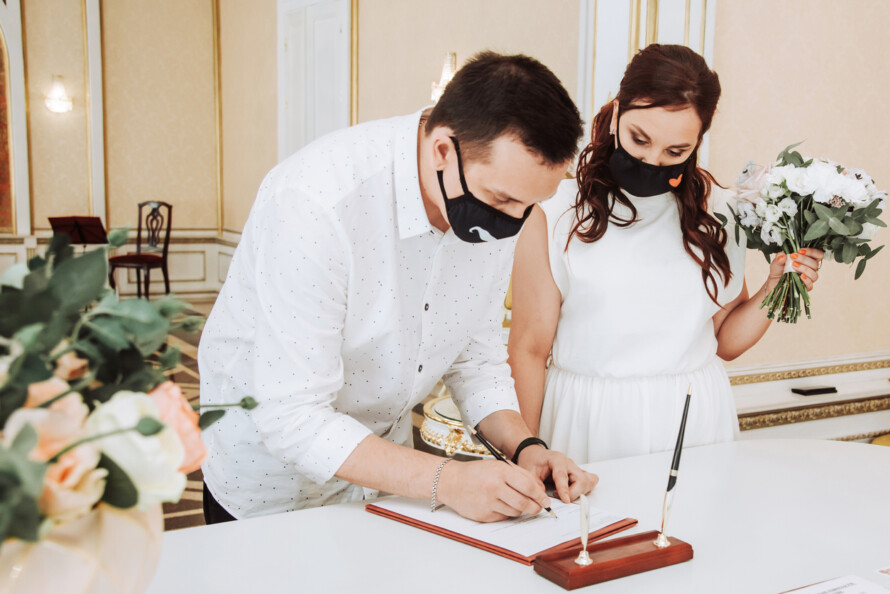We recently ran a story on mindset hacks for couples and thought our business community might also appreciate reading some of the tips. Here, two well-known wellness industry leaders — Chelsea Pottenger and Kat John — share approachable ways to clear your mind and manage stress.
Creating structure, identifying small things to be grateful for, focused breathing exercises, and learning something new are just a few mindset hacks these wellness pros suggest to manage stress.
If you’re stressing over running your business right now, having a hard time managing your emotions and your time, or simply looking for ways to change your mindset today, we hope these tips are helpful. If you’re interested in sharing this information with any of your clients, a couples-friendly version of this article can be found here.
Chelsea Pottenger, founder of EQ Minds and ambassador for R U OK? and Gidget Foundation, is a leading authority and speaker on productivity, mindfulness, and motivation. Here, Chelsea shares some of her stress relief tactics and her go-to online resources for meditation and mindfulness so you can get right into changing your habits today.
Deep Breathing Techniques
When dealing with stress and building resilience, we really need to take a holistic approach so ensuring our bodies and mind are in peak condition will help manage this difficult time.
Deep breathing is one of the best exercises you can do to help with stress. The benefits are numerous and include activating the parasympathetic system, improving gamma brain waves, increasing vagal tone, improving clarity and strategic thinking, and improving oxygen to the brain that helps with good decision making skills.
Three great techniques are:
1. Box breathing
2. 4-2-6 technique
3. Pranayama breathing
The best way to learn these techniques is to jump into YouTube. These breathing exercises are great as stress breakers. We have a YouTube channel, EQ Minds: Chelsea Pottenger, where we teach a lot of this stuff.
Meditation
The first thing to know about meditation is that nobody does it perfectly. There is no perfect place to do it, and you don’t need to sit and do it for a set amount of time. Obviously a quiet location will help, and twenty minutes would be great. But if you only have one minute in the shower to do it, well then, that’s your place and it’ll be great. There are so many great apps to help you learn to meditate; I like Headspace and Calm. I also have free meditations on my YouTube channel @EQMinds.
Gratitude
Find the positive in every situation. Journal down all the things you can be grateful for during this time. Examples: I no longer have to commute and get to spend time with my partner, my family; I can work from home and spend time working on or learning meditation, or exercising more.
Reset to The Positive
Ask yourself this question: “Is this behaviour helping or harming me?” Every 90 seconds we can either decide to revisit the same emotion, or hit the reset and start on something fresh. Think of something positive, and get our day back on track.
Stop Panic Scrolling
Most of the news is putting us in a state of stress and laying down negative emotion on negative emotion. Be informed, but be informed from the right places. Not from places that fuel negative emotions. Turn off the screens and stop panic scrolling.
Focus on Generosity
One of the best ways to change your mindset is to help others. Helping others is clinically proven to help you. There are so many people in a worse situation than you. How can you help someone? It doesn’t have to be anything major. Maybe it’s just picking up the phone and asking someone R U OK?
Keep a Journal
Journalling is such a great way to clear the mind. Don’t be afraid to use prompts to get your journal juices flowing, like I am grateful for; what will I let go of today?; I will focus on (something positive).
Use The Right Online Resources
Insight Timer has tons of great resources, including meditations and courses. My website EQ Minds has a series of online courses to help with stress, sleep, and productivity. I’m still in awe of the great content that YouTube has available for free — just make sure you’re looking at the positive and not the negative.
Practice Mindfulness
We need to be very mindful of the impact we are having on those around us. Social contagion is a very real thing. Nicholas Christakis has a great ted talk on this topic. How are we projecting our emotions on those around us and what effect is it having on them? Everybody needs to be in this together. That includes staying positive and uplifting those around us, who need our support as much as we need theirs.
Interested in more valuable tools and tips from Chelsea? Head to her site for e-courses on mindfulness, productivity, and sleep or visit her EQMinds YouTube channel.
Kat John is known for her real, raw, relatable approach to self-responsibility. She’s a meditation expert, coach, speaker, and founder of what she calls the ZEROFKS movement, where she gathers people around the world for a virtual dance party every Tuesday. Here, she highlights how to sort through what fks to give right now and how to dive into meditation by asking yourself one critical question.
During these times, I’ve been coaching my own mind and others’ to save their fks for the things that matter. What I mean by that is possibly, a decent portion of your energy, focus, and attention (aka fks) are being spent whinging, complaining, blaming, or sitting in stress. You can feel victimised by the current circumstances, frustrated about homeschooling, sad about losing work or business, etc. And you know what, fair enough. Take a minute to let yourself feel all of that. Write it out, get it out and consciously express what’s going on inside of you rather than drowning in it, or running away from it. Doing so allows you to take control of how you are feeling even though you may not be able to control the external conditions of life.
Once you have had your moment, ask yourself, “Where do I really want to put my energy, focus and attention (aka fks)?” Take a moment, let the answers come and write out what feels true for you. Answers like meditating, dancing, eating well, cooking delicious meals, serving your tribe, etc. may come up. These are your gold nugget answers to invest in, and I encourage you to do this anytime you notice yourself acting up or becoming anxious.
Be Present
Being present helps me tap out of the drama I’m either creating or getting sucked into, which although can be very easy and addictive to stay in, I don’t like suffering.
So when I notice my behaviour and that it’s not serving me, this is what I do in some of my meditations to refocus and come back to myself:
- Find somewhere quiet or peaceful (outside in the fresh air) and take a seat.
- I set my timer for five minutes and close my eyes.
- I take three deep, conscious breaths and sigh out if I feel the need to sigh out loud.
- Then I let my breath settle into its natural pace and rhythm, a rhythm that feels good, soothing, calming.
- I consciously listen to the sounds, smell the smells, taste any tastes and pick up on the temperature of the space.
I do this practice of tuning into my senses for 5 minutes because this process trains you to be in the present moment. There’s nothing but what’s happening right then and there and this settles me into a place of peace.
Clear Your Mind
When my head is foggy and I try to make it clear right away, often it doesn’t work so well. So I give myself a minute to chuck a wobbly. It’s normal to become overwhelmed, or stressed, or anxious when life isn’t going your way. However, when you stay in that state for too long you’re essentially choosing to stay there, which can lead you to feeling victimised or helpless. This doesn’t serve you or anyone around you
Here’s what I do to clear my mind:
1. Acknowledge what is going on in your mind that is causing you to feel powerless, anxious, not good enough, etc. Let yourself really see and notice what it is.
2. Ask yourself: “If I was a powerful person, what would I do?” Allow time for an answer to come through.
3. The answer you receive is your next best step to shift your focus, mindset, and reality by taking action. As a result, this helps clear the mind.
Create Structure
I encourage my coaching clients to create a simple structure and build on it as their commitment to the simple structure begins to stick. I recommend a structure that serves them mentally, emotionally, physically and spiritually. Without structure, the primal part of our brain is left to decide in the moment what it *feels* like doing — and that’s a recipe for doing sweet FA!
I suggest breaking the day into three parts — morning, afternoon and evening — and to commit to one, or at the most two (in the beginning), rituals that are going to serve you.
As simple and basic as it may seem, committing to self-serving practices leads to retraining your subconscious mind to behave in new ways. It takes 21 days to create a new habit, 3 days to undo the new habit if you stop, and 63 days to lock in the habit and create new pathways in your brain, which lead to longer term success.
I see this time as an opportunity for you to reassess your current structure and whether it is or isn’t serving you. If it’s not, there are endless tools available (many for free) to get you going. There are no excuses to sit in stress. Stress halves your ability to respond intelligently, so get cracking!
Here’s an example:
Morning Goals:
Move body
Meditate
Afternoon Goals:
Learn something new: podcast, online training, YouTube videos
Turn the music up and dance to blow off steam and cabin fever
Evening Goals:
Phones off by 9/9:30pm
Meditate and/or journal



